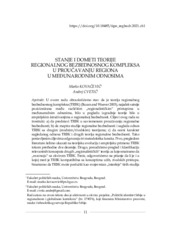Prikaz osnovnih podataka o dokumentu
Stanje i dometi teorije regionalnog bezbednosnog kompleksa u proučavanju regiona u međunarodnim odnosima
Reviewing the condition and reach of the regional security complex theory in the study of regions in international relations
| dc.creator | Cvetić, Andrej | |
| dc.creator | Kovačević, Marko | |
| dc.date.accessioned | 2024-04-02T11:37:24Z | |
| dc.date.available | 2024-04-02T11:37:24Z | |
| dc.date.issued | 2021 | |
| dc.identifier.isbn | 978-86-7067-285-7 | |
| dc.identifier.uri | http://rfpn.fpn.bg.ac.rs/handle/123456789/1247 | |
| dc.description.abstract | U ovom radu obrazložićemo stav da je teorija regionalnog bezbednosnog kompleksa (TRBK) (Buzan and Waever 2003), najadekvatnije pozicionirana među različitim „regionalističkim“ pristupima u međunarodnim odnosima, bilo u pogledu izgradnje teorije bilo u empirijskim istraživanjima o regionalnoj bezbednosti. Ciljevi ovog rada su trostruki: a) da predstavi TRBK u savremenom proučavanju regionalne bezbednosti; b) da mapira studije regionalne bezbednosti i sagleda odnos TRBK sa drugim (srodnim/rivalskim) teorijama; c) da oceni karakter sagledanog odnosa TRBK i drugih teorija regionalne bezbednosti. Tako postavljenim ciljevima odgovaraju tri metodološka koraka. Prvo, pregledom literature želimo ukazati na teorijsku evoluciju i empirijsku primenu TRBK tokom prethodne dve decenije. Drugo, ponudićemo pregled i klasifikaciju relevantnih koncepata drugih „regionalističkih“ teorija za koje smatramo da „rezonuju“ sa okvirom TRBK. Treće, odgovorićemo na pitanje da li je i u kojoj meri je TRBK kompatibilna sa konceptima užih, rivalskih pristupa. Smatramo da TRBK može poslužiti kao svojevrstan „interfejs“ širih studija regionalne bezbednosti. Kako bismo ilustrovali predloženi postupak, u trećem odeljku rada se raspravlja o prednostima koje TRBK kao teorija srednjeg obima ima u odnosu na rivalske pristupe koji se usredsređuju na regionalne poretke (Katzenstein 2005; Frazier and Stewart-Ingersoll 2010), regionalne bezbednosne zajednice (Adler and Barnett 1998), ili regionalni „multipleks“ međunarodni poredak (Acharya 2014; Acharya 2018). Zaključak upućuje na mogućnosti hibridizacije TRBK i srodnih/rivalskih teorijskih pristupa, što otvara značajna pitanja za dalji razvoj istraživačkog programa studija regionalne bezbednosti u trećoj deceniji XXI veka. | sr |
| dc.description.abstract | In this paper, we argue that the Regional Security Complex Theory (RSCT) (Buzan and Waever 2003) is most adequately positioned among various “regionalist” approaches in International Relations, both for theory-building and empirical research on regional security. The aims of the paper are threefold: a) to review the RSCT within contemporary International Security Studies; b) to map out regional security studies and reflect on the relationship between the RSCT and other (related/rival) theories; c) to assess the character of the relationship between the RSCT and other theories. The aforesaid aims are achieved in three steps. First, by doing a literature review, we want to point out the theoretical evolution and empirical application of the RSCT over the past two decades. Second, we offer a review and classification of relevant concepts from other “regionalist” theories which we consider to “resonate” with the RSCT framework. Third, we answer the question of whether and to what degree the RSCT is compatible with the concepts of the narrower, rival approaches. We argue the RSCT can be used as a sort of “interface” of wider regional security studies. In order to illustrate our research framework, the third part of the paper deals with and discusses the advantages that the RSCT, as a medium-range theory, has in comparison with the rival approaches that are concerned with regional orders (Katzenstein 2005; Frazier and Stewart-Ingersoll 2010), regional security communities (Adler and Barnett 1998), or regional “multiplex” order (Acharya 2014; Acharya 2018). In conclusion, the paper addresses the possibilities for hybridization between the RSCT and related/rival approaches, which have opened some important questions for further development of the research programme of regional security studies in the 2020s | sr |
| dc.language.iso | sr | sr |
| dc.publisher | Beograd : Institut za međunarodnu politiku i privredu | sr |
| dc.relation | info:eu-repo/grantAgreement/MESTD/Basic Research (BR or ON)/179076/RS// | sr |
| dc.rights | openAccess | sr |
| dc.rights.uri | https://creativecommons.org/licenses/by-nc-nd/4.0/ | |
| dc.source | Regionalna bezbednost : pristupi, elementi, dinamika | sr |
| dc.subject | International Relations, regionalism, regional security, Regional Security Complex Theory (RSCT), regional security order, security community, geopolitics, multipolarization. | sr |
| dc.subject | međunarodni odnosi | sr |
| dc.subject | regionalizam | sr |
| dc.subject | regionalna bezbednost | sr |
| dc.subject | teorija regionalnog bezbednosnog kompleksa (TRBK) | sr |
| dc.subject | regionalni bezbednosni poredak | sr |
| dc.subject | bezbednosna zajednica | sr |
| dc.subject | geopolitika | sr |
| dc.subject | multipolarizacija | sr |
| dc.title | Stanje i dometi teorije regionalnog bezbednosnog kompleksa u proučavanju regiona u međunarodnim odnosima | sr |
| dc.title | Reviewing the condition and reach of the regional security complex theory in the study of regions in international relations | sr |
| dc.type | bookPart | sr |
| dc.rights.license | BY-NC-ND | sr |
| dc.identifier.doi | 10.18485/iipe_regbezb.2021.ch1 | |
| dc.identifier.fulltext | http://rfpn.fpn.bg.ac.rs/bitstream/id/3638/fulltext.pdf | |
| dc.type.version | publishedVersion | sr |

